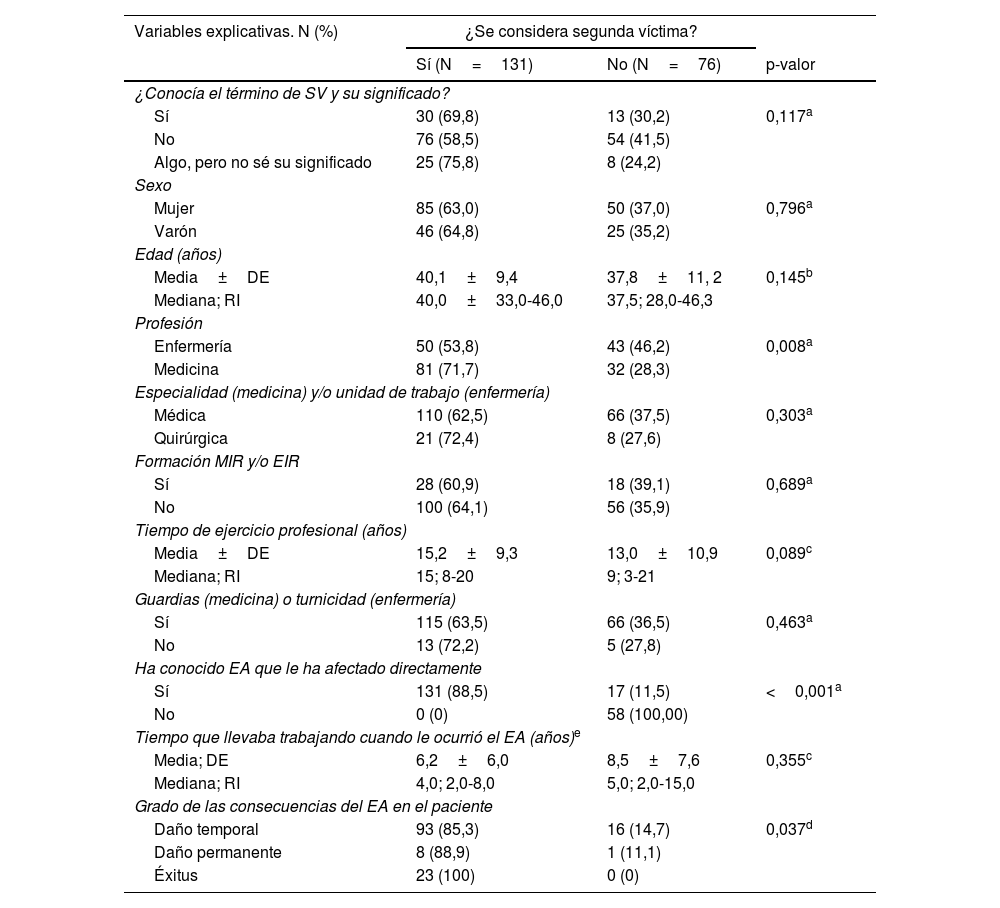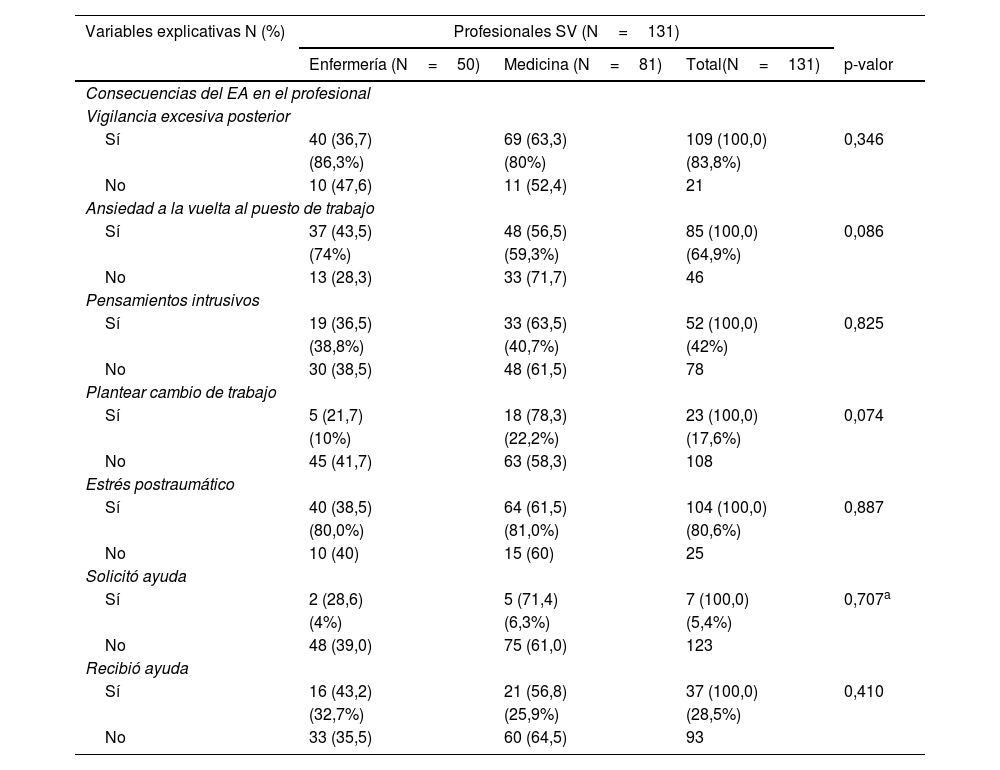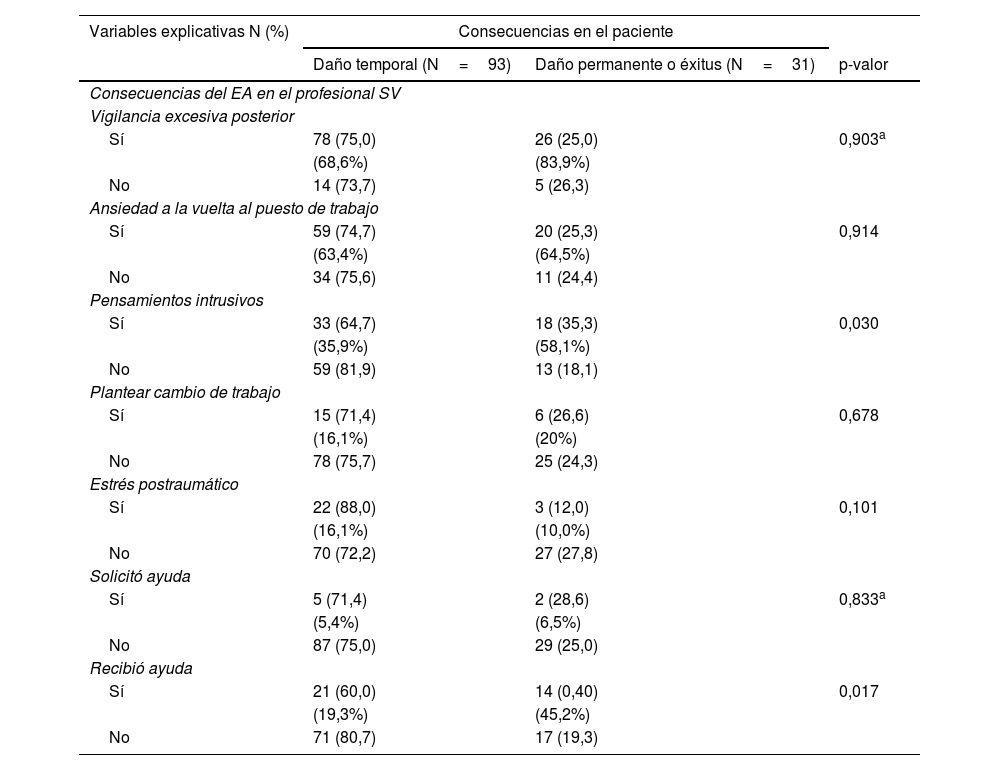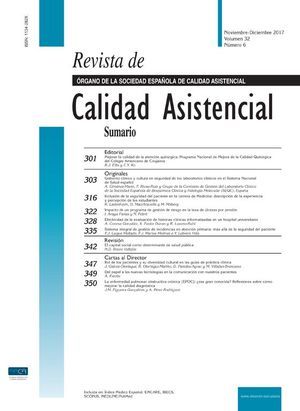Analizar las consecuencias psico-laborales sufridas por los trabajadores sanitarios que se consideran segundas víctimas (SV).
Material y métodosEstudio observacional descriptivo transversal entre los sanitarios de un hospital universitario. Se evaluaron las respuestas recogidas en un cuestionario diseñado ad hoc sobre consecuencias psico-laborales y el resultado de una escala de estrés postraumático, «Escala Revisada de Impacto del Estresor (versión española)». La comparación de las variables entre los grupos se realizó con la prueba Chi-cuadrado (o el test exacto de Fisher) cuando ambas eran cualitativas y con la T de Student para datos independientes (o el test U de Mann-Whitney), cuando una de ellas era cuantitativa.
ResultadosEl 75,5% (148/207) de los participantes del estudio sufrió algún evento adverso (EA) y de estos, el 88,5% (131/148) se consideraron SV.
Los/as médicos/as tuvieron 2,2 veces más riesgo de sentirse SV que los/as enfermeros/as (IC 95%: 1,88-2,52). El grado de las consecuencias del EA sobre el paciente explicó que los profesionales implicados en el mismo se sintieran SV (p=0,037).
El 80,6% (N=104) de las SV presentaron estrés postraumático. Las mujeres presentaron 2,4 veces más probabilidad de padecerlo (OR: 2,4; IC 95%: 1,5-4,0).
Los pensamientos intrusivos en las SV resultaron casi 3 veces más frecuentes cuando el daño sufrido por el paciente fue permanente o falleció (OR: 2,5; IC 95%: 0,2-3,6).
ConclusionesMuchos sanitarios, especialmente los médicos, se consideraron SV y gran parte de estos sufrieron estrés postraumático. El grado del daño que ocasionó el EA fue un factor de riesgo para ser SV y para sufrir consecuencias psicológicas.
To analyze the occupational and psychological consequences suffered by healthcare workers who are considered second victims (SV).
Material and methodsObservational, descriptive and cross-sectional study among the healthcare workers of a university hospital. The answers collected in a specifically designed questionnaire about psychological consequences at work and the result of a post-traumatic stress scale, “Impact of Event Scale-Revised (IES-R, spanish version)” were evaluated. The variables between the groups were compared using the Chi square test (or Fisher's exact test) when both were qualitative and with the Student's T (or the Mann–Whitney U test for independent data), when one of them was quantitative. The level of statistical significance was P<.05.
Results75.5% (148/207) of the participants in the study suffered some adverse event (AE) and, of these, 88.5% (131/148) were considered SV.
Physicians had a 2.2 times higher risk of feeling SV than nurses (95% CI: 1.88-2.52). The impact on the patient related to the AE explained why the professionals involved in it felt SV (P=.037).
80.6% (N=104) of the SVs presented post-traumatic stress. Women were 2.4 times more likely to suffer from it (OR: 2.4; 95% CI: 1.5-4.0).
Intrusive thoughts in the SV were almost three times more frequent when the damage suffered by the patient was permanent or death (OR: 2.5; 95% CI: 0.2-3.6).
ConclusionsMany healthcare workers, especially physicians, considered themselves to be SV, and many of them suffered from post-traumatic stress. The impact on the patient related to the AE was a risk factor for being SV and for suffering psychological consequences.













